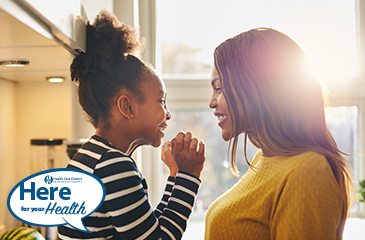HFYH: How to Talk to Your Child about Coronavirus
 Our kids hear about Coronavirus every day. From the news, to TikTok and YouTube videos, to conversations with their friends and families, Coronavirus is a topic they cannot avoid. We all want to make sure they get reliable, age appropriate information. We want them to hear it from someone close to them who they can trust, and who will deliver it in a way that will not create unnecessary anxiety.
Our kids hear about Coronavirus every day. From the news, to TikTok and YouTube videos, to conversations with their friends and families, Coronavirus is a topic they cannot avoid. We all want to make sure they get reliable, age appropriate information. We want them to hear it from someone close to them who they can trust, and who will deliver it in a way that will not create unnecessary anxiety.
“Parents can comfort and calm children with anxiety about the pandemic by providing simple information, reassurance, and focusing on appreciation and gratitude,” said Duclos Dessalines, MD, Pediatrician for the C. L. Brumback Primary Care Clinics.
A great place to start is to find out what your child already knows about Coronavirus. For your teenage kids, ask them what they are hearing about COVID-19 and if they have any questions. For younger children, try asking if they have any questions about the new sickness that’s going around. Then, follow your child’s lead and provide as much, or as little, detail as you think your child would like to hear.
It is important to offer comfort and honesty. You can explain that most people who get sick from Coronavirus feel like they have a cold or the flu. Others may be sicker and have to go to a hospital for care.
“Parents should try to stay positive and talk about all of the things people are doing together to help each other to stay healthy,” the pediatrician added. “Also, remind children of the actions they can take to keep themselves and their community safe. One of the best ways to reduce anxiety is simply to make time to talk and talk often.”
 If your child is worrying, they may ask if they will get sick from Coronavirus. Let your child know that kids don’t seem to get as sick as adults from Coronavirus. Explaining to them that there are doctors and hospitals that are ready to treat patients who get sick from Coronavirus can be reassuring. Even sharing that researchers are working on a vaccine, similar to the chicken pox vaccine they received, to prevent people from catching Coronavirus in the future, can set their mind at ease.
If your child is worrying, they may ask if they will get sick from Coronavirus. Let your child know that kids don’t seem to get as sick as adults from Coronavirus. Explaining to them that there are doctors and hospitals that are ready to treat patients who get sick from Coronavirus can be reassuring. Even sharing that researchers are working on a vaccine, similar to the chicken pox vaccine they received, to prevent people from catching Coronavirus in the future, can set their mind at ease.
Try to speak calmly when discussing Coronavirus. Kids will see if you are worried or upset. It is very possible they may be worried about family members, like their grandparents, since so much of the news discusses how older people are more likely to become seriously ill or die from Coronavirus. It might help them to have a frequent call or video chat with older relatives so they can feel reassured about their loved ones health and safety.
Dr. Dessalines suggests other tips like, “Monitoring and limiting media exposure, correcting misinformation and sticking to a routine as much as possible. It’s okay to tell children that even though there’s still much to learn about COVID-19, it’s up to the adults to figure it out, and they don’t need to worry.”